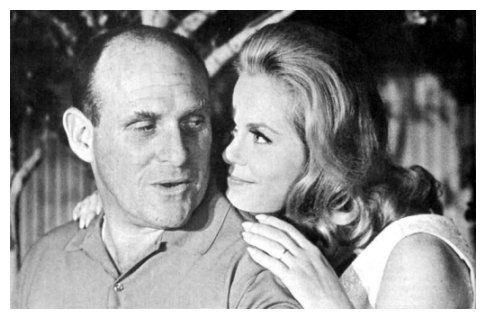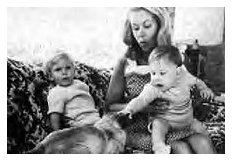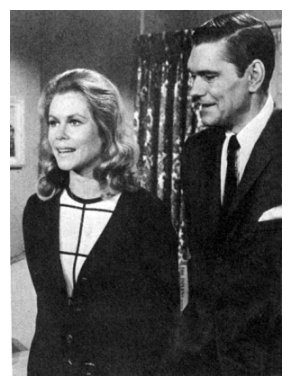
| Submitted by Windjammer as
originally appeared in the November 1968 issue of Movieland and TV
Time magazine. Liz Montgomery is not only a great actress – more important, she’s a great human being! "I don't know what I would have done without Elizabeth. She and her husband, Bill Asher, helped me come back. They gave me a new start – another kind of life." Director Paul Davis, known to his friends as Pesha, leaned back in a big, comfortable chair, his blue eyes warm, a wide smile radiating from behind his Van Dyke beard. Then, in an instant, the attractive face grew solemn, and Davis almost whispered, "Everyone was wonderful to me after Alice's death. Everyone was shocked; they all felt her loss. But Liz and Bill are the ones who actively did something."
After Paul Davis' loss,
Elizabeth Montgomery and husband Bill Asher Alice, of course, was Alice Pearce, the diminutive comedienne with the marvelous, rubbery face who won fame by playing the nosy next-door neighbor, Gladys Kravitz, on the Bewitched series. For some two years, right up until her death on March 3, 1966, Alice added her own inimitable brand of wild comedy to the show. On and off the screen, Alice Pearce was a hilarious riot those two years, bringing light and laughter to the entire Bewitched company. She was dying the entire time. Surely dying, slowly and painfully, from cancer, which doctors had discovered Alice had just a short time before Bewitched went on the air in September, 1964. But nobody on Bewitched knew Alice's fate already was sealed. Nobody knew at all – except the doctors and Pesha. That was the way Alice wanted it. That was the way it was. It would not be unreasonable to think, however, that Elizabeth Montgomery may have suspected something was wrong. She and Alice, from the start, enjoyed a rare rapport. Then, too, there was the fact that Paul, not then officially connected with Bewitched in any way, was at the studio every day. Husbands do not usually spend so much time where their wives are working, especially on a busy film set. Or perhaps Elizabeth attributed Paul's constant presence as merely the loving attentiveness of a new bridegroom. Alice and Paul had been wed only a few days when the actress' agent, George Morris, gave her the good news about the series. A very few days . . . so few that the couple, who'd married
on September 20, 1964, in a civil ceremony in Santa Monica, were still
on their honeymoon. They'd slipped quietly out of Hollywood to the romantic
old Coronado Beach Hotel, where they could have complete seclusion.
There, while the newlyweds soaked up the sun, came the call that Alice
was wanted by Elizabeth and Bill Asher, who is producer of the series.
She didn't, but she did have to cut her honeymoon short. Pesha, who'd been in show business a long time himself, offered no objections. He just came with her, determined that his beloved bride would have what life remained to her made as happy and as easy as possible. Even before their marriage, Paul and Alice knew what was in store. They had known ever since Alice had surgery in May of that year. There was nothing to be done medically. There was only each day to live fully, aware that every one could be the last. "I made a pact with Alice – and with myself – that I would never leave her," Pesha said with touching simplicity. "We didn't know if it would be three months or three years. We knew it was terminal, but we had no way of knowing how long we would be together. So I just stayed with her all the time . . . I went on the set with her, and administered medication when necessary. I got to know everyone on the show very well. "They were marvelous," the big man enthused. "They treated me like a member of the company." If they wondered, nobody said a word. Especially Elizabeth, whose affection for Alice grew daily. Without making a big thing of it, the tall, blonde, composed Elizabeth Montgomery and tiny, brunette, bouncing Alice Pearce grew to be as close as sisters. Their show, as everyone knows, was an instant hit, so their careers zoomed simultaneously also.
Off
stage, Elizabeth devotes herself to mothering sons, William Allen, born
in 1964 Privately it might to outsiders have seemed to be a different matter. Elizabeth and Bill Asher hadn't been married but about a year themselves, and were parents of their first son, Bill, whose birth came so close to the first airing of Bewitched that Elizabeth got up and went to work when her baby was only twenty-three days old. Despite dire predictions, it didn't hurt her, and nothing but sunny days seemed to be in the offing. Had anyone known about Alice's condition, he might have thought that she and Pesha were living a life of desperate despair, always in the shadow. Not so. Both of them realized fully that the joy they knew in their marriage had nothing to do with length of life. It had to do, instead, with a quality of living. So they were happy, and Paul Davis, with rare devotion, arranged his life to suit the needs of his wife. "Alice didn't drive," he told our reporter, "so I would drive her to the studio at six in the morning, then I would leave for a while to go to the shop. Then I'd go back to the studio for lunch with Alice, then back to the shop – then back to the studio and wait until she was finished with the day's shooting. "I learned to know the show very well," Paul concluded with a touch of wryness. That he did. He learned to know Elizabeth Montgomery very well, too, and she became one of his better customers at Pesh's Framing Studio and Art Gallery, the successful business Paul had established in Hollywood, and which he still owns. During that time, of course, Paul did absolutely nothing about his own theatrical and TV career. It had been a good, long one, for, as he put it, "I had been an actor, then a stage manager, then had gone into theatrical and TV directing. When I came out to Hollywood, I worked for Lucille Ball for a year and a half. She had a little theatre on the Desilu lot for new talent, and I ran it. "Alice and I met," Paul reminisced, "when I was the stage manager for the play, Bells Are Ringing in which Alice performed. We met, fell in love, went on tour together with the show. We came out here, and Alice did some film work and I went to work with Lucille Ball." Bells Are Ringing first was seen on Broadway in 1957, the year that Alice Pearce's first husband, composer John Box, died. (He wrote, among other things, It's a Big, Wide, Wonderful World.) Alice later was to say, of that traumatic time "If I hadn't been working, I think I'd have gone crazy." But she was working, and Pesha was there, and when her initial grief, was past, Alice found herself being drawn more and more to the engaging, big bear of a man. He loved her, too, but it was years before circumstances were such that they felt free to marry. "We always planned to be married," Paul said, "and when I was financially settled, we did." He had started his business in 1963, and it was booming. In 1963, too, Elizabeth Montgomery married William Asher, and before the next year was out, both couples were involved in the happiest chore of their lives, Bewitched. The four also were close personal friends – sufficiently at ease to be able to laugh together over any unpleasantness that might arise. "When the show first opened," Paul chuckled, "someone did a story on Liz and Bill and called them 'cloying.' They hadn't been married very long at the time, and it kind of offended Liz; she took it as a personal affront. "Alice and I were on the set the day Liz was reading the article. She was looking not too happy, and we walked over, asked her what was the matter, and she showed us the article. "Alice just said, 'Well, that's all right. You're the REAL McCloys. So after that, they were known to us as the McCloys – we called them that all the time. What had started out by hurting Liz, Alice and I turned into a gag. We just laughed about it." They laughed a lot, the Ashers and the Davises, but as the days of their appreciation for each other grew longer, the days of Alice Pearce's life grew shorter. Still, the gallant woman gagged it up at the studio and at parties, and even at home. For Alice and Pesha, like Liz and Bill, bought a beautiful house, "The first real home I've ever had," Alice exclaimed delightedly. Paul still lives there, high above the famed Sunset Strip, looking out over the city – a incomparable view that on a clear day lets him see the ocean. Neither Elizabeth Montgomery nor Alice Pearce had this problem.
Everyone knows that Elizabeth's father was Robert Montgomery, long a
screen idol. By the time Elizabeth was born, however, her father had
set his sights on becoming a producer-director. Thus it was that Elizabeth
spent a lot of time in English schools; her father was producing films
there. She ultimately graduated from the exclusive Spence School in
New York, and made her debut in 1951 at the posh Cotillion Ball. So Elizabeth and Alice shared an amazingly similar background, which undoubtedly contributed much to their relationship. Primarily, though, they liked each other because both had depth, and warmth – and courage. "When Elizabeth is working, she's like a pioneer lady," Paul Davis said appreciatively. "She's direct, does her job, and never complains. Liz has an inner strength that could weather anything. All during the series, I've never heard her complain once. Most people are climbing the walls at the end of three years on a show, and want out. I've never heard Elizabeth say anything like that. She really does have that inner strength of a pioneer woman – a woman going out to new frontiers who makes the best of any and all difficulties." Paul spoke of Elizabeth Montgomery, but he knows far better than anyone he could also have been speaking of his wife. During their short two years together, Alice kept a journal, which she asked Paul to give to a doctor after her death, because "It may be of some help in the treatment. "I feel the progress of the disease in my case is unusual,"
Alice wrote with astounding objectivity, "because of my mental
attitude. I am a supremely happy woman. I have never been beautiful,
but I have been blessed with a rich career and the love of two fine
men. The strength I have found in the devotion of my dear Paul is beyond
measure.
"Even when he is gone, I do not feel the black helplessness or hopelessness usually associated with my condition. In truth, I do not associate myself with my condition. I do not attempt to think happy; I am happy, blessed with a love, which comes to the few, not to the many. I am humbly grateful for my beautiful life.” "We had a marvelous life together, as long as it lasted," Paul echoes. It had to end, however, things being what they were. Despite every effort to keep going, Alice began to grow thinner and thinner. When she died, in Cedars of Lebanon Hospital, she weighed only seventy pounds. Still, she managed to work, almost until the day of her death. At Alice's request, there were no formal funeral services. She was cremated, and Paul and her parents, who live today in retirement in La Jolla, California, requested that friends contribute to the Nat "King" Cole Cancer Research Fund. Now Paul was alone. Not all his prior knowledge, not all his own quiet bravery had prepared him, really, for Alice's going. Reaction set in. "Liz and Bill were marvelous to me during that period," Paul said. "They asked me one day what my plans were, and I said I wanted to get back into the business . . . back into directing. And they said okay – just like that." For a moment, Paul sat silent, his eyes looking off into space. Then, in an obvious effort of will, he pulled himself back to the present and went on. "They waited for a very good script to get me started right – something they felt I could do well . . . "They protected me like a baby," Paul smiled. "Everything went well, the show came in on time, and there was good response to it. It was a very successful show, and this really started me on my way and resurrected a career in which I hadn't been active for quite some time. I'd taken the time to be with Alice." Rising, Paul walked to the big window overlooking the city. For a short time, he stood there, back to the room, then turned and said, "Liz was so great on the set. She gave me every help . . . every cooperation. She made it work for me. It was a wonderful, wonderful gesture." Since then, Paul has directed many of the Bewitched shows, and others, as well. Right now, he has a screen property, which he hopes to direct. He's also writing a book about his late wife to be entitled, Softie, because "That's what I used to call her. "Alice Pearce was unique in a world of many kinds of people," Paul told us. "You can always say 'that type' about many people, but you could never put Alice into any category. Her whole way of looking at life was unique. She had a great capacity to love, and I was very fortunate to have been loved by Alice. I think this was true of anyone who came in contact with her – for a day or even an hour." Elizabeth is unique, too, says Paul. "She's really like three people to me. She's the actress I work with; she's a customer at the Gallery, and she's a very dear friend. "It's a marvelous personality she has in the shop; she's great with the kids who work for me. Elizabeth is a lady of great taste; she paints very well herself, but won't sell anything. She just gives her pictures to friends. But if we have something really good in the shop, she goes right to it; She knows the best. "If you go to Elizabeth's house," Paul continued enthusiastically, going back to his chair, but leaning forward to make a point, "you realize what tremendous good taste she has. She doesn't flaunt her knowledge, but you see it in her home, in the books – in everything around her. "And as an actress, I believe she has a tremendous career ahead of her. I don't think she's been given the recognition she truly deserves as yet, but I'm sure it's forthcoming. A lot of her talent has been exposed, of course, but within the confines of a television series. She has given consistently good performances over the years – and that goes for Dick York, too. It's amazing that the Academy hasn't acknowledged this by giving them the Emmy."
She
and TV husband Dick York work extremely well together. Not only amazing, but unfortunate, too, Paul plainly feels. For his professional admiration of Elizabeth Montgomery approaches the intensity of his personal appreciation of the beautiful young star, and he feels she has been dealt with unfairly. "There is a third side to Elizabeth," Paul went on quietly, "a side which few people are allowed to see. This is really a very soft, shy, gentle girl. "Three people," he mused almost to himself, "but they all have one thing in common. They blend to make one good person. "Without her I would have gone out of my mind." With her help, he has made the kind of life that Alice would
have wished him to have. For that alone, even if there were not countless
other reasons, Paul-Pesha-Davis, will love Elizabeth Montgomery forever. |




